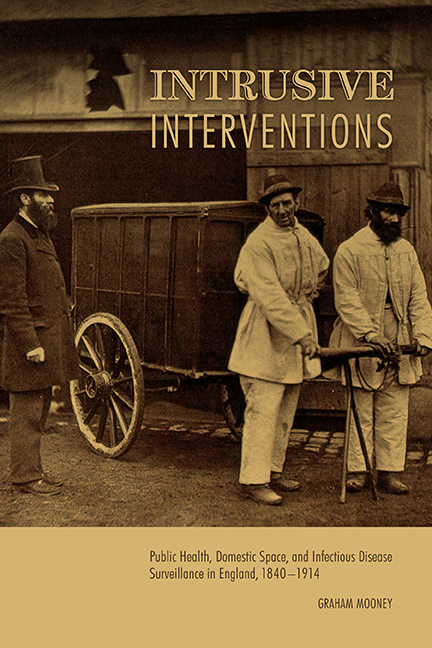 Intrusive Interventions
Intrusive Interventions Summary
In an 1876 address that was reported in both the medical and popular press, the newly inaugurated president of the Society of Medical Officers of Health, Dr. George Buchanan, spoke to his colleagues about “Citizenship in Sanitary Work.” As one of the first medical officers of health in London—appointed in 1856 at the parish of St. Giles in the Fields—and at the time an assistant medical officer to the Local Government Board, Buchanan had been steeped in the public health problems of English urban life for two decades. Despite this wealth of experience—or more likely because of it—that October Friday night Buchanan drew inspiration from the American state of Massachusetts. He pointed to the great strides in sanitation since the formation of the Massachusetts State Board of Health in 1869. Buchanan recounted at length the part played by the board in the recent establishment of an abattoir in the neighborhood of Brighton, which had lately been annexed by the city of Boston. The board's attempt at nuisance control had met with predictable resistance from local butchers, but by 1876 the city had an exemplary facility that, remarkably, found favor with the butchers and was ready to be administered by the city of Boston itself.
So what did Buchanan want his metropolitan audience of medical officers to take from this transatlantic story? Certainly he made no attempt whatsoever at comparison with the regulation of the meat trade in Britain. Rather, his message concerned the broader philosophical issues of compulsion and citizen participation in public health matters. It was, Buchanan observed, through the careful formulation and implementation of compulsory legislation that the Massachusetts Board of Health was able to intervene against slaughterhouses. The board was encouraged by petitions lodged by Brighton's inhabitants, who were fed up with blood running in the streets and the offensive stench of offal. In the very same spirit of commonweal, Bostonians had lobbied successfully for the creation of a local board of health for the city in 1872.
“I have told the story of Massachusetts’ sanitary progress very badly,” Buchanan said, “if there is any need to point its moral for ourselves.” Of course, he spent the rest of his speech doing exactly that. And the moral was this: the need to educate ignorant and careless people in the individual and communitywide benefits of sanitary reform.
- Type
- Chapter
- Information
- Intrusive InterventionsPublic Health, Domestic Space, and Infectious Disease Surveillance in England, 1840-1914, pp. 1 - 16Publisher: Boydell & BrewerPrint publication year: 2015


